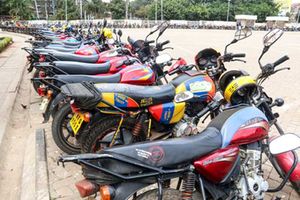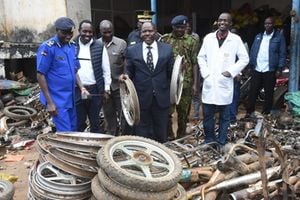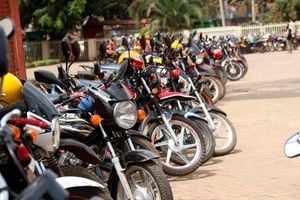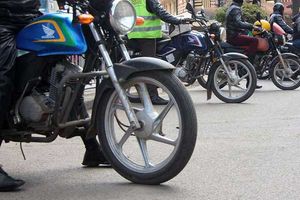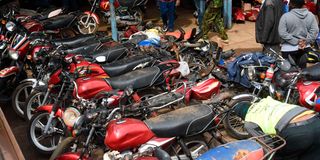
Boda-boda riders and other riders whose motorbikes were allegedly stolen were recently, search for their motorbikes during a display by police at Eldoret Police Station.
Albert Muthoka, a boda boda rider in Emali town, Makueni County, could not have suspected that the phone call he received on the night of February 3, 2020, would lead to his murder.
The voice on the other side of the line did not betray a sinister motive. It was familiar, friendly and reassuring. It was the voice of a neighbour and customer Muthoka, 21, had known for the past three years.
Muthoka lived with his mother in Emali, a popular trading town along Mombasa Road where motorists encounter traders selling tomatoes and onions. He had just returned home after a hectic day when he got the call.
They were two customers. They needed to be taken to Sultan Hamud, a famous rest stop for truck and bus drivers plying the busy Mombasa Road about eight minutes from Emali.
Before they got to Sultan Hamud, the passengers asked him to divert from Mombasa Road to a narrow earthen road. It had rained heavily in recent days so the usually stunted vegetation on the sides of the road had grown taller. The downpour had also made the clay soil in the area soggy and slippery, slowing down Muthoka.
The thicket and muddy terrain provided a perfect cover for crime. The two pillion passengers turned against Muthoka. They beat him up, tied him to a tree and then butchered him.
On February 7, Muthoka’s body was found in the bushes at Sultan Hamud with his hands tied together using a sisal rope. His left leg had been amputated.
Police statements show the criminals would later sell Muthoka’s motorbike to an unnamed Tanzanian trader for Sh30,000, they confessed in court.
The court proceedings ended on May 28 at the Kajiado Law Courts with all the accused pleading guilty. But the court acquitted the four; three men and a woman who had been accused of the murder.
Judge S.N . Mutuku of Kajiado High Court noted that the murder had been committed in the course of a robbery but that the prosecution had not provided sufficient evidence that the four were the killers.
Muthoka is one of the victims of a cross-border syndicate of motorcycle theft, through which riders have been brutally murdered, often by people known to them and their bikes spirited across the border.
The Nation has interviewed several people, including law enforcers, victims, and officials of boda boda associations, who have painted a picture of a well-orchestrated syndicate that has sucked in boda boda riders and dealers across the Kenyan borders with Tanzania, Ethiopia, and Uganda.
Repossession strategies
A lot of the noise on the loss of motorcycles by boda boda riders has involved the repossession strategies used by the lending companies.
These complaints were the subject of an investigation by the National Assembly's Finance and National Planning Committee that summoned five micro-lenders over allegations of predatory lending practices in which some motorcycle owners pay as much as Sh500, 000 for the bikes.
Watu Credit Limited, Mogo Motorcycles Kenya, JoyInc Group, 15 Minutes and My Boda were required to explain their business models particularly with regard to the asset finance package of Buy Now, Pay Later.
MPs also wanted the National Transport and Safety Authority (NTSA) and the Insurance Regulatory Authority (IRA) to give details of ownership records for the motorcycles that were the subject of the inquiry and compensation schemes.
Committee chairman Mr Kimani Kuria told Nation the probe has been concluded, but the panel is yet to adopt the recommendations of the report.
The MP, however, revealed there is a proposal to amend the Central Bank of Kenya Act to bring the Buy Now, Pay Later (BNPL) products under the regulatory purview.
But a bigger problem that is yet to be addressed is the theft and killings of boda boda riders to feed a cross-border syndicate.
In neighbouring countries such as Tanzania, the thieves have found a ready black market for the two-wheelers that is beyond reach by Kenyan authorities. Once the criminals cross the border the trail goes cold as the pursuing law enforcers run against a wall of diplomatic etiquette.
"Immediately the bike crosses the border, the government's power ends there," chairman of the Kenya National Boda Boda Association Ken Onyango says.
Even worse, the victims who spoke to Nation said, is the complacency of the law enforcement agencies in investigating the cases. This has forced some of the irate boda boda riders to take the law into their own hands.
In an interview, police denied being the weak link in the killing of boda boda riders and the theft of their motorcycles.
Two weeks ago, our sister publication, the Daily Monitor, reported how a Ugandan man was allegedly murdered by a machete-wielding gang from Kenya on suspicion of being among the people who have been crossing the border to steal motorcycles.
Whereas the manned official border entry points offer some guard rails against attempts to sneak stolen motor vehicles across the border, the small size of motorcycles makes it possible for the stolen ones to evade the prying eyes of law enforcers by using the hidden, unofficial entry points, popularly known as panya routes.
That is also the case within the country, which makes it possible for the nimbler motorbike to be driven for long distances, even from Nairobi to Loitokitok, while avoiding detection.
"A motorcycle will pass through a small or narrow path. They will not necessarily go through the normal streets in a town," says Kitui Central OCPD Peter Karanja.
The motorcycle engine capacity, adds Mr Karanja, will also use less fuel to cover longer distances, citing the case of one that was intercepted at Emali on its way to Loitokitok from Kawangware slums in Nairobi.
The strategic location of Emali town—which has turned it into a trading centre for oranges and onions from Tanzania and Irish potatoes from Central Kenya—has also gained notoriety as a conduit for the stolen bikes.
Here, there are as many legal migrants from the neighbouring countries trading in crops and livestock, as there are illegal ones whose job is to ship stolen motorcycles across the border.
Records of foreign nationals convicted for theft of motorcycles rose three-fold from three in 2022 to nine last year, official data shows. However, the data does not show the nationality of the foreign thieves nor where they committed the theft.
Stolen motorcycles pass through Emali town on their way to Tanzania via an illegal entry point in Loitokitok. From Emali, they pass through the Oloitokitok road, a less busy road frequently used by tour vans going to and from Amboseli National Park and cement trucks for National Cement's clinker plant in the town.
The secretary-general of Boda Boda Sacco Emali Municipality, Muthiani Muthoka, said his late brother, Albert, was the first victim of violent theft of motorcycles in Emali. He said it is the only case that has been concluded. Since his death, three other boda boda riders have been killed in Emali, Mr Muthiani says.
The killings of riders and theft of motorcycles dates back to more than eight years across the country; border towns such as Kajiado and Busia have been flashpoints.
In Kajiado County, which borders Tanzania, at least 10 people were killed by the end of last year, data provided by Boda Boda Safety Association of Kenya, Kajiado County Branch shows. Another 50 riders were injured and over 600 motorcycles stolen.
There is less killing of riders in urban areas such as Nairobi compared to rural parts of Kenya. Indeed, more households in rural Kenya own motorcycles than their urban counterparts, the 2019 census report done by the Kenya National Bureau of Statistics shows. Some families in rural areas have sold their land to buy motorcycles while others have taken huge loans to invest in the thriving boda boda business.
“In Nairobi, riders have seen people die. So when they are ambushed by the criminals they easily surrender the bikes,” said Mr Onyango. “But in other counties such as Kakamega and Bungoma, there have been a lot of deaths due to the resistance.”
Stolen motorbikes
Machakos Town Boda Boda chairperson Allan Musembi said the value of motorcycles has appreciated considerably over the years, giving rise to the killing of riders. A quality bike on loan can go for as high as Sh280,000.
In Makindu, less than an hour’s drive from Emali, the body of another rider, known only as “Kamal,” was found in a bush off Mombasa Road. His bike would later be recovered in Loitokitok.
“That was the first motorbike to be recovered, others vanish into thin air,” says Martin Mutua, who helps Watu Credit, one of the financiers of motorcycles, to recover stolen motorbikes.
Mr Mutua says he has recovered four stolen motorcycles in six months for Watu Credit.
Ironically, what killed Muthoka and Kamal is what makes every other business thrive — good customer service.
This tried and tested best marketing strategy is driving boda boda riders to an early grave.
“He (Kamal) was killed by customers he had been carrying for a long time,” says Mr Mutua.
After killing Kamal, the thugs stabbed his eyes. Although the idea that the image of what a person saw before his death remains imprinted on the retina has been discounted as a myth, some murderers have continued to gouge the eyes of their victims for fear that their image might be recorded in the retina.
Tomorrow: The enemy within? How boda boda riders are implicated in the killings of their own.

